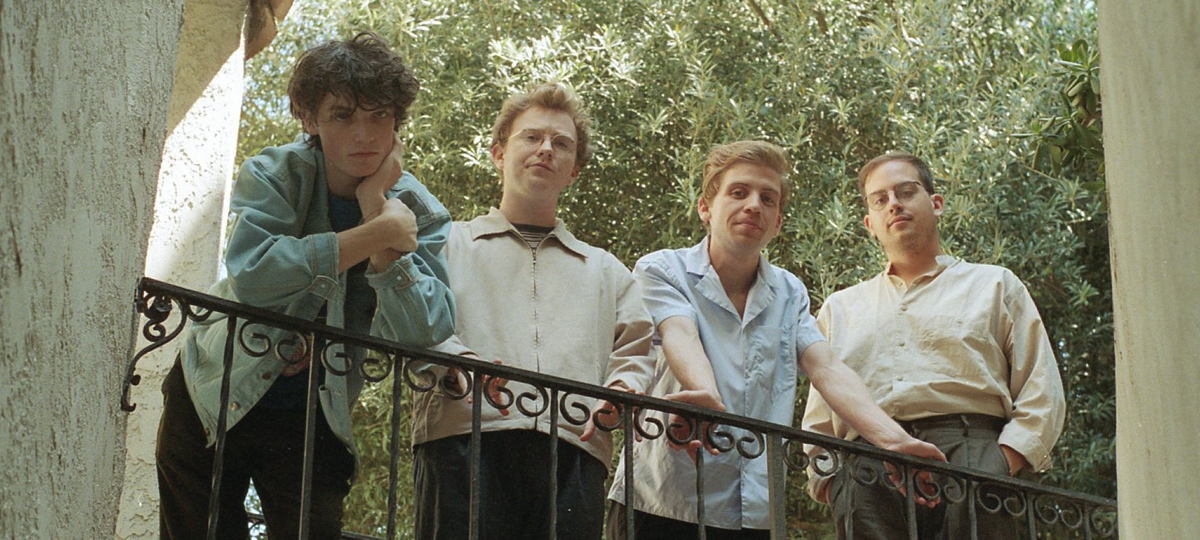
"Pardon my dullness, what’s my part?" ponders Slow Hollows frontman Austin Anderson in the concluding lines of 'Young Man', a wry ode to discerning self-analysis and lackadaisical thinking, which features on the quartet's aptly titled new album, 'Actors'. In conversation, Anderson explains that after reflecting on the people in his life, he concluded that, "Everybody's just kind of acting in their own thing and just working to get through whatever it is that they need to get through." This universal theme runs through the entirety of 'Actors', from the conjecture of "make believe that you're not really what you seem to be" in 'Two Seasons', to the rallying "act the part until you exist" in 'Cowboy', which burns with a self-awareness that gives the album true heart.
Having first met bassist Aaron Jassenoff and drummer Jackson Katz five years ago via various musical connections when Anderson was sixteen, Slow Hollows added trumpeter Daniel Fox into the fold after his work on their 2016 album, 'Romantic'. "He was an irreplaceable asset, so we had to have him in the band," recalls Jassenoff, and together, the tightly knit four-piece have spent the last few years working on 'Actors' alongside collaborators such as Tyler, The Creator (whom Anderson had previously played on both his 'Cherry Bomb' and 'Flower Boy' albums, after receiving a DM from Tyler via Twitter), Ryan Beatty, Grizzly Bear's Chris Taylor, and Peter Bjorn and John’s Björn Yttling.
And if the above credentials weren't already impressive enough, Anderson's personal CV also includes work for Frank Ocean, whom he met at one of Tyler, The Creator's recording sessions for 'Flower Boy'. "I think Frank said to Tyler, 'I want an emo band kid, like a white emo band kid, to sing something.' And then that somehow turned out to be me. He just wanted some white fool," says Anderson dryly.
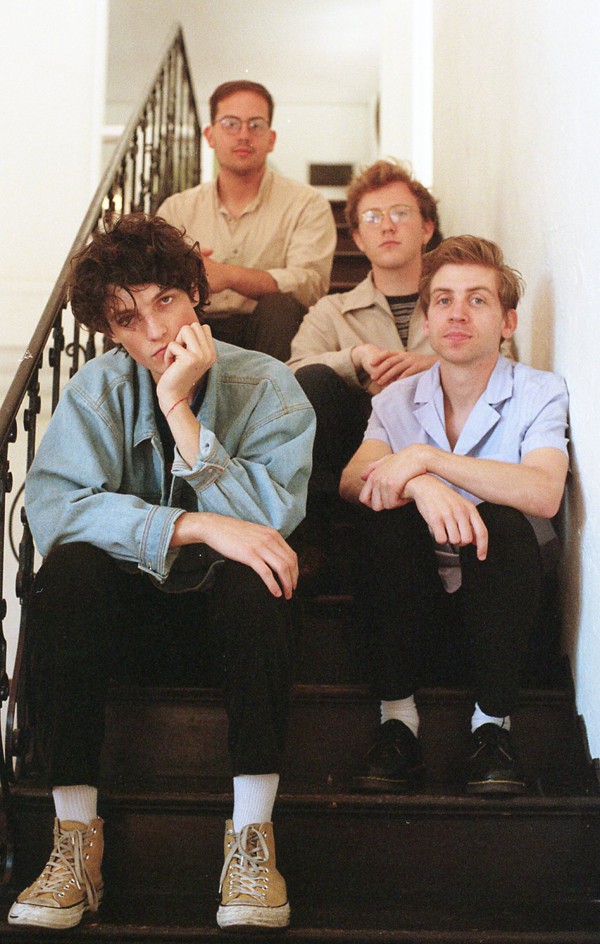
On 'Actors', Slow Hollows pull together threads of evocative lyricism, sophisticated musicianship, and a purposeful sonic palette, resulting in an album that paints a poignant portrait of internal and external conflict - equal parts world-weary and self-willed, but always thoughtful. Anderson says of the storytelling record's pacing and plot-points, "When I hear the album or think about it, I think about it in three parts. Not that it was written to be three parts, but the first four songs kind of stumble through a bunch of different genres, and it all kind of happens at once - it's very upfront and there's a lot of production going on. The middle mellows out a little bit and doesn't feel as much of a reach production-wise, and then the back kind of turns into a little bit more of an orchestraI ending, smoothing it out a little bit."
Prior to the release of 'Actors', Coup De Main met with Slow Hollows in Los Angeles to discuss the germination of their new album, fear being an easier emotion than love, and to express our admiration of their deadpan delivery of one-liners ("Do you think we're handsome?" ask the band during an accompanying photoshoot)...
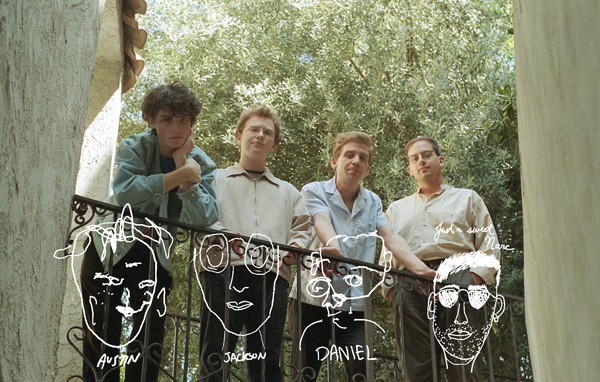
COUP DE MAIN: Why did you decide to name your new album 'Actors'?
SLOW HOLLOWS - AUSTIN ANDERSON: Originally, there was a song called 'Actors' - I don't even remember what it sounded like, it was one of the first songs written, like four years ago probably. I liked the way that it felt because our first record was called 'Atelophobia' and I liked that it would be another word with an 'A', but also couldn't really disprove what 'actors' meant to me. Whenever I would think about the people around me, it felt like a safe thing to think about - everybody's just kind of acting in their own thing and just working to get through whatever it is that they need to get through. And also a lot of the songs kind of felt like I was writing from other people's perspectives, or just observing characters, and then 'Actors' felt like it was tying everything in.
CDM: There's a man called John Koenig who has created an online dictionary of made-up words called The Dictionary Of Obscure Sorrows, aiming to fill the gaps in the English language with new words to describe abstract emotions. One of the words he has made up is 'sonder' which he's defined as: "The realisation that each random passerby is living a life as vivid and complex as your own—populated with their own ambitions, friends, routines, worries and inherited craziness—an epic story that continues invisibly around you like an anthill sprawling deep underground, with elaborate passageways to thousands of other lives that you’ll never know existed, in which you might appear only once, as an extra sipping coffee in the background, as a blur of traffic passing on the highway, as a lighted window at dusk." Do you think it's more common for people to think of themselves as the main protagonist in the story of their life with everyone else playing a supporting character? Or to feel like they're a side-character in other people's lives?
AUSTIN: I would hope that you think of yourself as a protagonist. If you are unaware of the fact that that's not true though, you're probably a little bit blinded and have just got your blinders on--
SLOW HOLLOWS - AARON JASSENOFF: Like a person in a market that cuts lines, or thinks that they deserve more. If you don't think that you're the protagonist and that no-one else has their own vivid lives that they're living, then you're probably mean to servers. Stop! Be nicer to people.
SLOW HOLLOWS - JACKSON KATZ: If you're just a protagonist, doesn't that just make you a narcissist?
AUSTIN: Yes, but I think narcissism is healthy in a way?
SLOW HOLLOWS - DANIEL FOX: A balance is important.
AUSTIN: I think that it is thought about too much. And you shouldn't think of yourself as a protagonist or an extra in somebody else's life, because then you're just going to be thinking about it too much and you'll probably miss something.
AARON: I think that's what happened with social media - people put themselves at the forefront of what it means to be important, or themselves, when in reality, you need to look at people around you and say, 'They're also having a bad day and they're living their whole life.' Just do both. That's okay.
CDM: What do you think is the difference between a protagonist and a hero?
AUSTIN: Anybody can be either, it just depends on your actions, as simple as that is. It really just depends on what you think a hero is, like if you think a hero is somebody doing something good for another person; a protagonist doesn't necessarily need to do that, you can kind of just be the worst and be a protagonist and still be upfront kind of doing what you need to do. I think it's just what your actions are and how you see yourself. If you see yourself as a hero, you're also probably not much of a hero--
AARON: You're more of a protagonist. I think heroics come in smaller degrees, but you're a hero in tiny little ways every day. If you're doing something good, you're pushing it in that direction.
CDM: What was going through your mind while writing the album's opening-track 'Actress'?
AUSTIN: I actually didn't write that with the intention of it being on the album. I like to just make little loops in Logic whenever I'm bored, as we all do, and Daniel and I were searching for an intro for the record and we tried a few things that we kind of turned into this big cinematic intro.
DANIEL: The first one was so bad; it's comical. Well, I don't want to say it was bad, but it just didn't fit at all. We were going for this big orchestral opening, like 'Space Odyssey' kinda, this huge moment where it all comes back down, but we blew it on the first try.
AUSTIN: Since I knew that 'You Are Now On Fire' was going to be either the first or second song, we had to approach that in a way that is sensitive because it's a song that is not something that we would have put out before, and also can be taken the wrong way if heard in a weird context. So, it felt like throwing this dirtier or weird intro right before it would give it a little bit more context. And also, I don't want the album to be taken too seriously. Like, I know there are a lot of serious themes, but really, at the end of the day, it's just another album. And we're just a band. It's not that serious. We're nothing that crazy. We're having a great time. But that's kind of why the first thing you hear is a botched trumpet solo and Daniel shouting "fuck".
<Slow Hollows voice dissent>
AUSTIN: Not botched, but a botched note - an amazing solo with a botched note. And then the lyrics, I didn't finish writing and I mumble. I didn't want it to be taken too seriously.
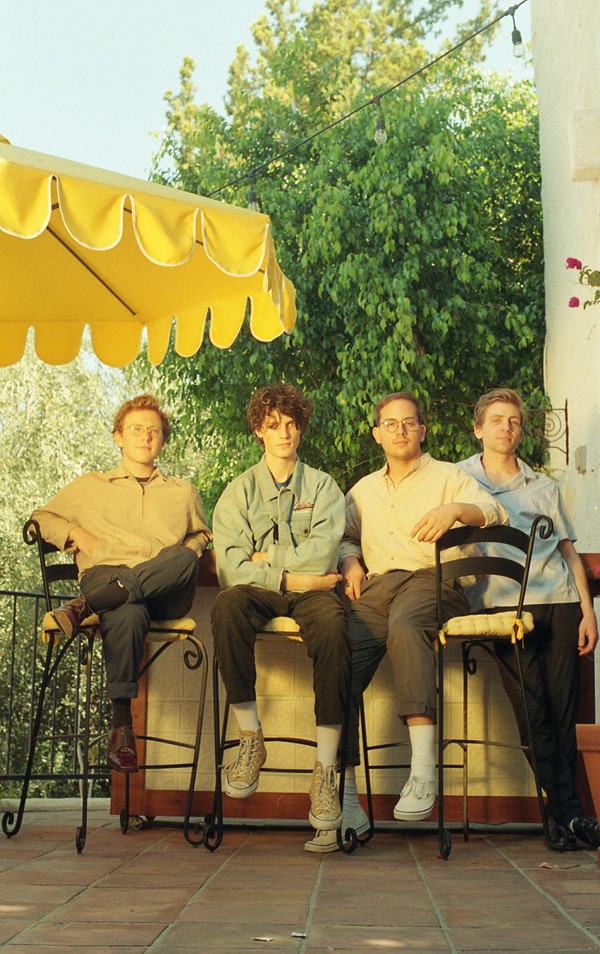
CDM: Did you deliberately want to juxtapose the intensity of the lyrics of 'You Are Now On Fire' against such euphoric sounding instrumentation?
AUSTIN: It never felt deliberate. Like, the hook came first. And there are a lot of different ways that I tried to go about arranging it at first when it was in a demo form. And then it just kind of turned into this big euphoric pop thing, so I made sure to be a little bit conscious of what I was saying and make sure that it fit with things that we or I've said before on songs, and that it didn't just turn into this big euphoric pop song talking about something that I shouldn't be talking about or that I didn't feel comfortable talking about. Usually, it's dumb dark shit.
CDM: Was it fun to experiment sonically like that?
AUSTIN: So fun.
AARON: Yeah, I remember when I walked into the studio, this is when Daniel was recording a while back, and it was these two and Michael Blasky - he was playing the saxophone. I walked in and they both went, 'We're making a Summer anthem!' <laughs> And then they showed me the song for the first time and I remember being like, 'Woo!'
AUSTIN: We realised you make better songs if you think about it as a joke - when almost everything you put on it is kind of a joke, it usually works better because your jokes are better first ideas. So jokes are usually a good way to pitch an idea without other people thinking you take yourself too seriously. Like, 'Haha, wouldn't it be funny if we turned all the saxophones on at the same time?' Because that would be crazy. And then you turn all the saxophones on and you're like, 'This is pretty dope,' and then it ends up being the song.
DANIEL: Yeah, there are eight saxophones on that song.
CDM: Austin, you open that song saying: "You found love, I found fear." Is love or fear a stronger emotion?
AUSTIN: I think they're equal, I think it's just what you choose. That sounded kind of corny, but I think they're both equal. It just depends on if your head is strong enough to pick one or the other. Like, you can pick either one in any situation - I think they really can battle it out for a while.
AARON: I think fear is sneakier. You know when you're in love with something or with someone. Fear is sneakier because you don't look at it. It's the thing in your life that you're avoiding at all costs, but don't realise you're avoiding. It's like that little blind spot in your sight that you can't see is fear and it's the thing that's making you stop and stopping you from doing something.
AUSTIN: I also think it's a lot easier. Fear is way easier.
CDM: There's two different versions of 'Heart' on your album - one that you worked on with Ryan Beatty and Tyler, The Creator, and then 'Heart (Reprise)' which you originally released as a live studio video back in January 2018. What was the evolution and development of that song like?
AUSTIN: The hook was written in a session for Brockhampton actually, like a long time ago, maybe like two years ago. And it sounded a lot like the Tyler and Ryan version, just a simple backed pop beat, and the hook was written. I kind of sat with it for a second and the album hadn't really been formed in the way that it is now, so I didn't really know what the direction was going to be. So when we hadn't put out music in maybe a year or two, and I just wanted to get something out, I arranged what is the reprise to be a live session and have it fit more with what we've done before - a little bit more mellow. We sat with that for a while, and then we got the opportunity to work with Chris Taylor from Grizzly Bear to produce that song and he killed it - he brings a lot of great texture. So we finished that and then that song was done for a few months, and then I found somewhere in my note app the Brockhampton demo and I just liked it. Not a lot more, but I just really liked the way it felt. And I felt like the hook was really, really strong as a pop song. I think I called Aaron and I said, 'What do you think if we just made this a song?' And he was like, 'Yeah, I think you should do it.' So then Daniel and I worked tirelessly to get it to be a pop thing but couldn't necessarily nail some of the drum aspects and the arrangement, just because we'd been sitting with it for so long, you kind of lose perspective on what's going on. And then I remember showing Tyler, and he was like, 'This is great, but the drums are really bad.' And they weren't even Daniel's drums.
DANIEL: Yeah, they weren't my drums, but they haunt me.
AUSTIN: They weren't. I won't say whose drums they were, but yeah, the drums are trash. And then one day, Tyler said, 'Let me make drums for you,' and then I went over to his house one morning. The way that he works is, he's not afraid to just start from scratch and throw everything around. So he put all the stems into a session and just kind of rearranged the song, and the first thing he made was Ryan's outro - the half-time very 808-heavy thing, and that was really cool, just because I didn't even know that song could sound like that. We kept changing the very speed of it and the pitch of it, and it just sounded cool every way.
AARON: It straight up goes.
AUSTIN: Yeah, I like it. And then, I just felt like if we separated them enough in the tracklist and they were sonically different enough, you would only really remember the hook. I wanted themes to tie in differently, and there are a few different melodic lines and lyrics that pop up throughout the album.
CDM: Was it Tyler's idea or yours for Ryan to come onboard?
AUSTIN: That was my idea, because in the Brockhampton session he sung the original hook, and Daniel and I have been working with Ryan and are just close friends with him. And I really like his voice and he can sing anything - he can pull off anything really well. And I was just sick of hearing my own voice.
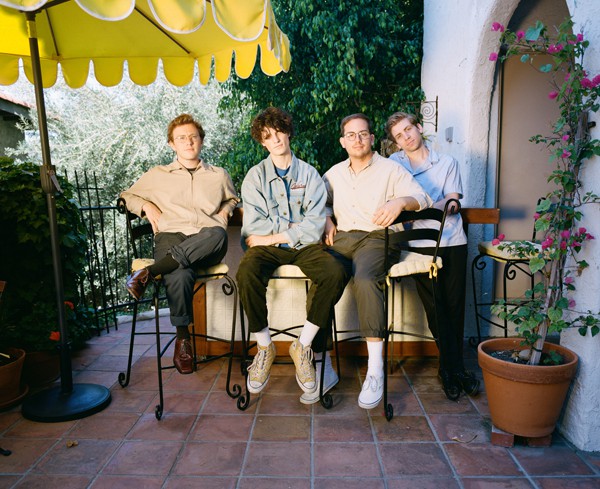
CDM: In 'Two Seasons' you say, "Do you love me? Or do you love the feeling?" What do you think is the difference between being in love? And being in love with love?
AUSTIN: Being in love with love, I think that's an infatuation thing, and I think that's more of an ego thing. Being in love with love, is just being in love with the idea of you having things and assets.
JACKSON: I also think it's a lot easier to be in love with the idea of love and obsessing over it, and it's much easier to say, 'I love the feeling,' but it's much harder to actually be in love.
AUSTIN: Yeah, also that lyric is more like, I got really bummed out because I realised that it's all a chemical thing actually. And when you think about what love is, you're just like, 'Oh, that's just my brain doing chemical shit.' And it kind of just deflated that whole concept and was kind of a bummer. So I think it's learning to shut that out and not think about it and not think about the actual feeling of it, but more, just what it is on paper. Maybe.
AARON: Being in it, as opposed to breaking down what it is.
AUSTIN: Yeah, or just love in a selfish way. Like, loving the feeling of having something near you just for the sake of, 'That's mine. That's my love.' Not just like, that is what love is.
CDM: What are the audio samples of at the end of 'Two Seasons'?
AUSTIN: There are two audio samples happening. The first one is a conversation I recorded with a family member of mine who struggled with a lot of drug issues. Growing up, he was about the same age as I am, and we grew up in the same household for a few years. He struggled with a lot of really intense drug issues, and I was talking with him about that - he didn't know it was recording and he doesn't know it's on the record yet and I hope that's okay. But the other sample that's happening is a conversation that was recorded by my aunt, and it's between me and him. I think we're both thirteen-years-old or fourteen, and I hadn't even hit puberty yet, so I sound like a little boy or girl. And it's the same two people talking, just eight years earlier. I think we were talking about something stupid, like, 'Oh yeah, freshmen are so annoying once you get into high school.' I don't think anybody else would necessarily pick up on it, it was just more for me personally - I really wanted to be able to hear the same two people having a conversation years apart. One of them was about how his brain is fried and the other is about high schoolers being annoying, or something stupid and innocent like that.
AARON: I like what you say in it. I like the way that they're put together because there's a part where you're so mad. Right? Look how angry you are. Yeah, that's amazing. I always like that.
AUSTIN: Thank you.
CDM: What was running through your mind while writing 'Cowboy'?
AUSTIN: That was one of the first songs that was written for the record. I can get really angry for no reason and just get mad at having to do anything. Like, I just get angry at the thought of having to do anything. And that's just kind of a collage of being a young dummy - just being angry and being like, 'Fuck you, fuck you,' and none of it really makes sense. At the end of the day, it's just kind of all like picking out an abstract angry line, and it just felt silly, and I like it sonically. Daniel helped with the piano on it and it just felt kind of like a Fiona Apple thing, just the way that the piano is compressed. If I could change some of the lyrics I would, but I think what was running through my mind is just being angry at nothing for no reason.
JACKSON: I love that it's essentially like an angry punk rock lyric, if you were to just maybe read the lyrics or based off of what you just said, like over this sweet sounding beautiful song, that's very funny to me.
CDM: What's your favourite song on the album lyrically?
AARON: I like 'Get Along'. I don't know what it's about. Sometimes I'll ask him [Austin] what songs are about and most of the time he responds, but this time he didn't want to tell me and I respect that. No shade or anything, but I like it because I can put my own shit on it, and there's one line in it specifically where he's talking about being on the way somewhere and then beating himself up and I have done that so many times in the car when I'm just on my way somewhere and then being like, 'Why did I just work myself up for literally no reason on stupid stuff?'
AUSTIN: It's kind of weird for me to be like, "I love these lyrics," but I do like 'Get Along'. I like 'Blood' a lot, just because it is also about that same family member and it just came really quickly. I think my favourite lyrically is probably 'Get Along' or 'Blood'.
JACKSON: Not to piggyback, but I love 'Get Along', and also 'Two Seasons'. That chorus we already talked about, but it's so simple and means so much - those two phrases are an amazing two questions.
DANIEL: 'Get Along' and 'Two Seasons' are my favourite. Yeah, I'm the same as Jackson. "Do you love me? Or do you love the feeling?" I feel like I've been there multiple times, like, 'What is actually going on?' The confusion of a relationship.
CDM: I love the lyrics, "Sleep wrecked so I won't forget / How to be as an island," in 'Come Back In'.
AUSTIN: Thank you.
AARON: I think I like that line a lot too. "With the sand / And then the snow." I love that too. Those are both really very similarly textured things. I love it.
AUSTIN: I like lyrics in 'Come Back In' too.
AARON: Nailed it.
DANIEL: I like them all.
AARON: Arrogant.
CDM: Well, we were talking about narcissists earlier...
AARON: We all know one, uh oh... it's me.

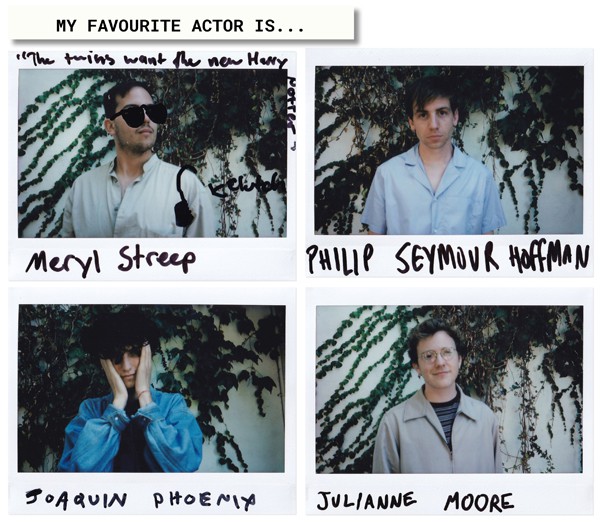
CDM: In 'Get Along' you say, "Hate is just my lack of even trying." If you're fighting with someone, is it worse if they're angry at you? Or if they’re apathetic?
AUSTIN: It depends on how you absorb it. I think that anger takes a little bit more, but it depends on the person. But for me, personally, I do believe that line - it really is just very simple and like any negative thing it can be really, really easy. It's a little bit of a safer feeling than anything positive, in a way, where in the depression state you're just like, 'Oh, I'm not doing shit, and I'm not gonna do anything, and this is much safer and much easier.' But being apathetic can be more drawn out and can be a little bit more dangerous because sometimes it can be a little bit sneaky and hidden, and it can be mistaken for other things as well. I think it can be mistaken for emotions that are just not warranted.
AARON: I'd rather someone hate me or be mad/angry at me than apathetic towards me, because at least they're angry; they can tell me exactly what's wrong. If they're apathetic, that means they've just completely given up.
CDM: You can still change their mind if they're mad at you.
AARON: Exactly. You know there's a part of them that cares, right? If they're angry at you, that means that they're like, 'I just love you so much, but why are you doing this?' As opposed to apathy? Which is just, 'You fucked me over, I don't give a fuck, whatever.'
CDM: I was very pleased to find out 'Hell' is on the album! Why did you decide to go with more of a guitar-driven arrangement for the album version of the song?
AUSTIN: Sonically, there was a lot of piano that was happening on the album and I didn't want it to be a singer-songwriter piano kind of thing. Also, just from the fact that we released it as a piano version I did, I wanted to switch it up just for the record, but it also felt a little bit sweeter. And I take out a lyric: "Bring me strength to die, I need no complication." It felt really silly singing that still, so just for my own sake, and also for the listener's sake. Listening to somebody who's in their early 20s sing about dying a lot, it can kind of get straining and kind of feel like a broken record, and it's also safe and easy to think about and be singing about. It kind of gave a new perspective with the song, it felt a little bit more uplifting, and the "dig like animals" bit felt like you were digging for something a little bit more positive than just the strength to die or something stupid like that. Not that it's stupid, but weeding out unnecessary negativity towards the end felt like something that would make sure I wouldn't regret it in the long run later on. I usually regret a lot of the negativity that I put out later on.
CDM: The album cover is cool. Did you guys come up with the creative for that yourself?
AUSTIN: Yeah, so what happened is, we were actually just doing a photoshoot as a band and for one of the photos we just wanted a lipstick thing as a prop. And one of the photographers was like, 'Why don't you put lipstick on Jackson?' I've posted that photo - it's a green photo with me just putting lipstick on Jackson and it looked like a painting. I was like, 'I want that to be the album cover,' and we kept finishing the record but realised it didn't look like it belonged colour-wise. So we kept recreating me putting lipstick on Jackson for six months, and we did a bunch of different photoshoots of just me in different surroundings--
JACKSON: One involved snakes. It was fun and scary. There was one where we were in the mountains and where there was all this dry brush everywhere and they wanted me to get in the brush and I was like, "Guys, there's definitely snakes here." And they were like, "No, there's no snakes! There's no snakes!" And so when we got into the brush, of course, immediately, there were three rattlesnakes and--
DANIEL: He almost sat on a rattlesnake.
JACKSON: Yeah, I was very close to sitting on it.
CDM: I'm glad you're okay.
JACKSON: Me too. But yeah, we did a few different ones and we ended up with the pink.
AUSTIN: We wound up just going to a photo studio and were like, 'We've shot this too many times at this point, we need to just get it done,' and pink satin felt like something that was cool. So we had it professionally lit and just shot a bunch of different ones that felt right.
AARON: I've had a lot of people come up to me and ask me how I feel about Jackson being the cover because we have known each other the longest in the band. And literally, every time, I'm like, "What do you mean? That's my best buddy, I'm so happy that I get to look at him. I'm excited about it." Everyone's like, "Oh, okay, sure." Like, no! I love him.
AUSTIN: It's great, I like the picture a lot.
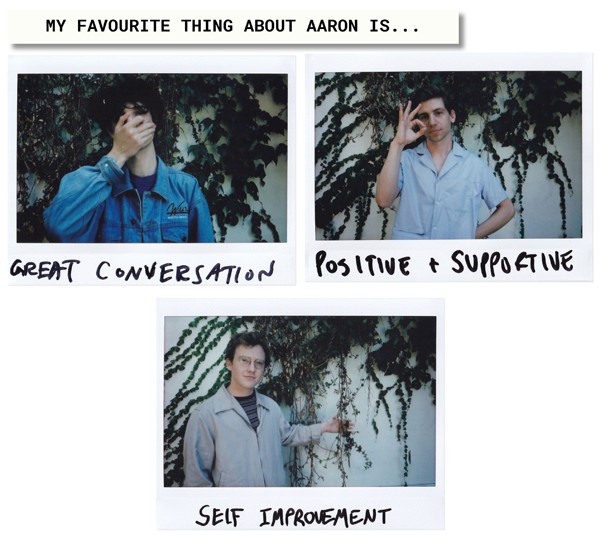

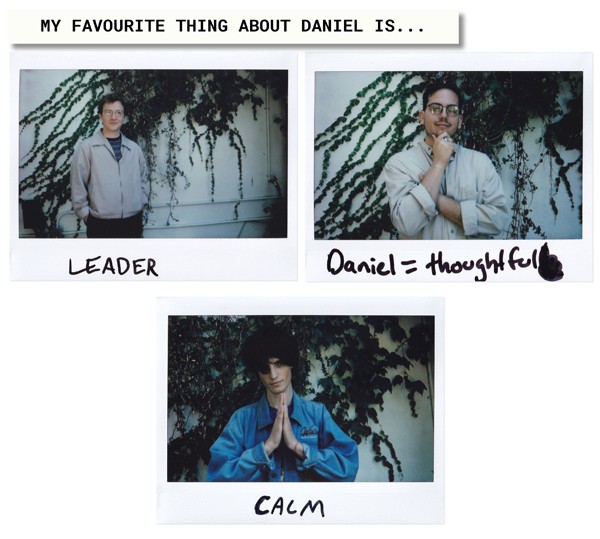
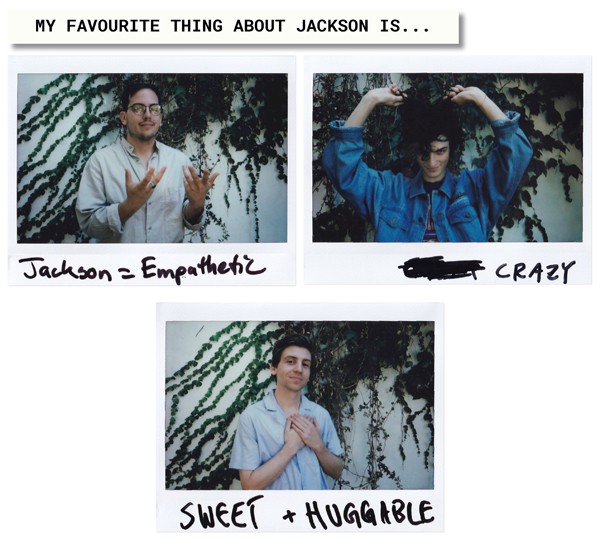
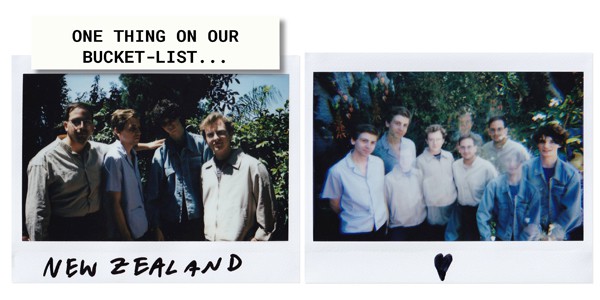
This interview has been edited and condensed for clarity.
Slow Hollows' new album 'Actors' is out now - stream it below:
Watch the music video for 'Two Seasons' below...

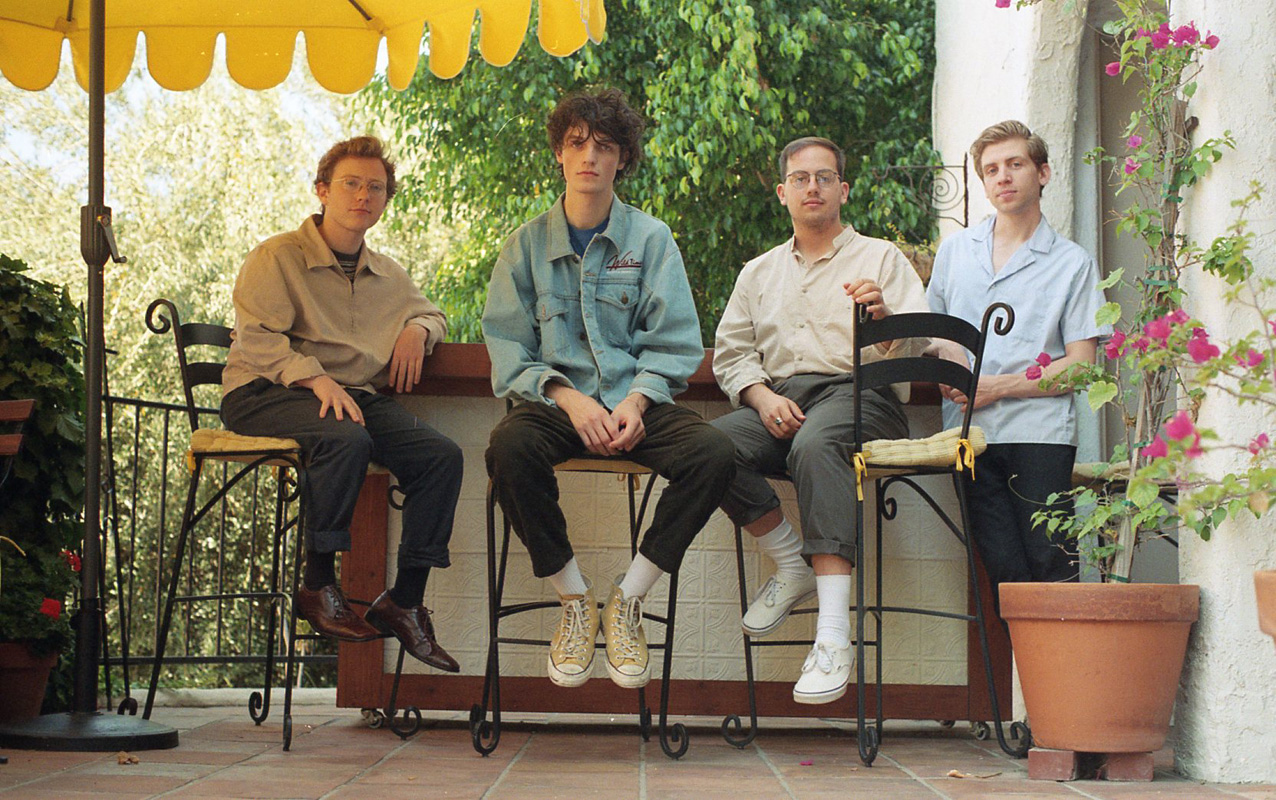
 Slow Hollows
Slow Hollows